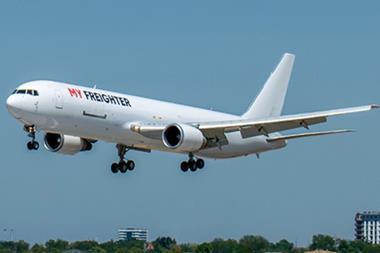Swiss WorldCargo is an airline that likes to innovate, and in a move to “keep pace with the modern challenges of global logistics” it has created a new organisational structure and revealed a further push into digitalisation.
Swiss International Air Lines head of cargo Ashwin Bhat tells Air Cargo News that moves to develop the digital services offered by the airline are part of efforts to create greater transparency.
Recently, Swiss launched a new website with improved track and trace functionality. Bhat says the airline will launch a second version of the website later this year, one which will offer customers the ability to create a bespoke area within the portal that emphasises the most important pieces of information to them.
“If you want to see track and trace and you want to see your invoices, you can pull it up and they would then be there every time you sign in,” he explains.
Also as part of efforts to improve transparency along the supply chain, the company last year allowed a series of active tracking and monitoring devices to be used on aircraft.
“If there is deviation to the standard agreed process, we can react to it but thankfully so far in January and February we had close to 200 such shipments and did not have a single incident,” Bhat reports.
The company has also created a new three-pillar structure in order to make the business more agile. The three structures are: business development and customer experience; area and contribution management; and quality and services.
Christian Wyss, the new head of cargo quality and services, explains: “The first pillar [business development] will concentrate on the strategic side of the business, developing the future basically.
“The second pillar [area and contribution management] is where we have the sales organisation, outstations organisation, and revenue management.
“The third pillar, which is my domain, is quality services, which is the service delivery side of our business.”
Wyss says that his area of the business designs all processes and procedures, takes care of the smooth operation of the carrier’s hub, runs the service centre, which ties together all the different parts of the business that are in touch with customers, and deals with post-transportation issues such as complaints and claims.
The service centre has two main functions; firstly, keeping customers up-to-date with shipments and helping solve any issues that arise, but also helping the rest of the Swiss WorldCargo team.
Digitalisation, and possibly artificial intelligence, has a role to play here, says Bhat.
“A lot of emails are floating around, sometimes asking regular questions; what do I do with live animals? What do I do with DG cargo? What do I do with this or that?
“Sometimes answering these questions takes time and creates frustration when the data is there. Let’s use artificial intelligence to pick that data and tell you immediately. Let’s use this to create value.”
Bhat emphasises that technology is not being used to replace people – as air cargo is a person to person business − but to speed up processes.
The area and contribution management pillar, which is headed up by Alexander Arafa, has been re-organised to bring sales and revenue management together to speed up the sales process.
Meanwhile, the new business development pillar, led by Andrés Perez, already has a number of projects on the go.
Bhat says that the division is currently looking at how to “further enhance” capabilities in the pharmaceuticals sector, including evaluating its current facilities and working on CEIV certification for the airline, its Zurich hub has already achieved the certification.
The division will also analyse how the supply chain journey can be improved by creating bespoke solutions for customers that require them.
Says Wyss: “In this industry we tend to get stuck in our original idea of delivering service because everything is standardised.
“We tend to forget the true needs, the true requirements from our customers. We are just thinking in those traditional schemes. We see a big opportunity to deliver a better service in the future.”










